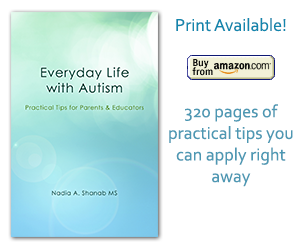Nadia Shanab | Uncategorized
Anecdote A student with ASD told me “Let me tell you a joke!” I gave her my 200% attention and said: “Go ahead!” But deep inside I thought that it will definitely sound like anything but a joke. Here is what she said: “A student went to school without doing his homework. When the teacher
[read more]
Comments Off on Can Autistic Children Make or Tell Jokes?
Nadia Shanab | Uncategorized
Why doesn’t the grapefruit have any grapes inside? I was taken aback and shocked when a HF (high-functioning) student asked me this question. I had never thought about it before. I had never asked myself the same question. Don’t you think that the question really makes sense? How is the grapefruit related to grapes, apart
[read more]
Comments Off on What Is “Normal”? What Is “Special?”
Nadia Shanab | Uncategorized
You may have watched the video about the autistic basketball hero, Jason McElwain. Jason is a special ed. student who used to be the team manager, helping the coach and the team with all they need. On the final game of the season, the coach decided to let Jason play the last 5 minutes of
[read more]
18 May 2013 | Tags:
autism,
communication,
discipline,
flexibility,
health,
independence,
organization,
parenting,
rules,
schedule,
social interaction,
speech Comments Off on Sports and Autism
Nadia Shanab | Uncategorized
Jason used to help the coach and the team with some chores, hand them water, and towel off their sweat. The coach has recently decided to have Jason wear the jersey just let him feel how it is like, and let him paticipate in a real game. Look what Jason has achieved. Amazing! Unbelievable! Must-see
[read more]
Comments Off on The Autistic Basketball Hero
Nadia Shanab | Uncategorized
The new DSM 5 is due this month (May 2013). It is published by the American Psychiatric Association (APA). Three diagnosis will be removed: Aspergers Syndrome, PDD-NOS, and CDD. They will go under one diagnosis, autism. How is that going to affect parents, cliniacians, educators, advocates, and the children themselves with these conditions? Read the
[read more]
Comments Off on The New Diagnostic and Statistical Manual (DSM 5)
Nadia Shanab | Uncategorized
As an educator, I try to keep the following two main goals as a top priority when working with spectrum kids. 1-TEACHING INDEPENDENCE 2- DEVELOPING/ IMPROVING SOCIAL SKILLS Academics are very important to be taught. But life skills are most important. Children grow up very quickly. Time flies, and soon the elementary grader becomes a
[read more]
16 May 2013 | Tags:
asperger's syndrome,
autism,
communication,
early intervention,
eye contact,
flexibility,
incentive sticker sheet,
independence,
parenting,
social interaction,
speech Comments Off on Socialization: An Important Life Skill
Nadia Shanab | Uncategorized
Instead of saying the child is obsessed with a certain subject or an activity, we can call it an interest or area of strength. Things that we keep doing or repeating over and over are things that we can do well. For example practicing a sport, riding a bike, playing a game, reading in certain
[read more]
Comments Off on An Obsession Can Lead to A Career
Nadia Shanab | Uncategorized
According to “Autistica”, 24% of autistic children are non-verbal or minimally verbal. Researchers at the University of Bermingham, UK, supported by “Autistica” found that: 1- The learning of a language is tightly related to motor behaviors (like knocking a toy), and the imitation of facial experssions or gestures. The imitation of gestures and facial expressions
[read more]
Comments Off on A Hope for Non-Verbal Children
Nadia Shanab | Uncategorized
Children with autism don’t respond to the games, like peek-a-boo, the way neurotypically developed kids do. They avoid the interaction with people or tune them out altogether. Remember that the poor social skills are one of the autism’s main traits. Researchers found that parents should rather play with their kids the games they like. In
[read more]
Comments Off on Playing the Child’s Favorite Game Reduces Severity of Condition
Nadia Shanab | Uncategorized
This is the biggest study of fetal growth and autism ever. Extreme, whether big or small, growth of the fetus in the womb can be a risk factor of developing autism. Babies weighing over 4.5 kg (9lb14) or under 2.5 kg (5.5lb) at birth showed higher incidence of autism. This isn’t related to whether the
[read more]
Comments Off on Fetal Growth Related to Autism

